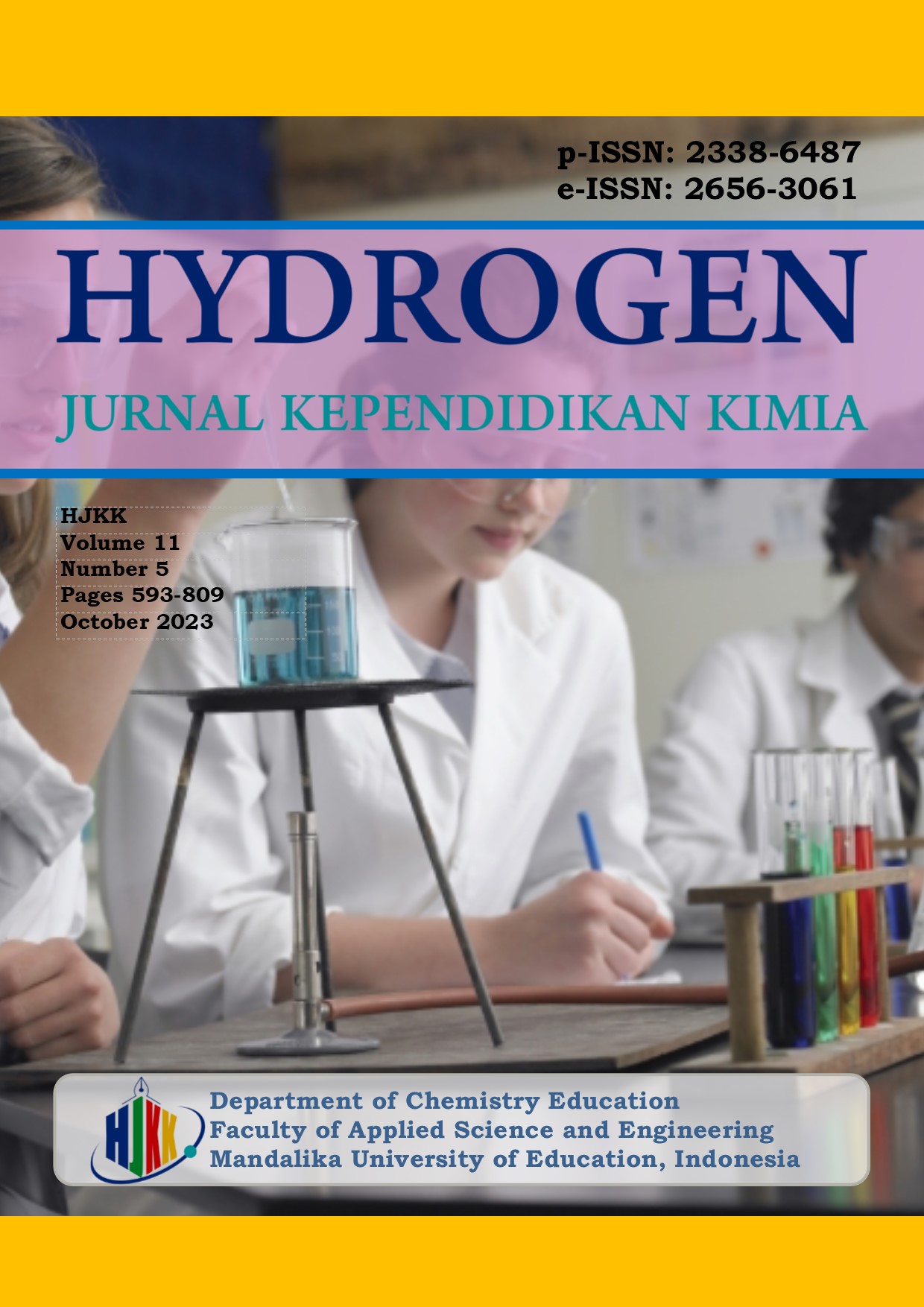Efektivitas Model Pembelajaran Berbasis Proyek terhadap Pemahaman Konsep pada Materi Larutan Asam Basa
DOI:
https://doi.org/10.33394/hjkk.v11i5.8675Keywords:
efektivitas, larutan asam basa, pemahaman konsep, project based learningAbstract
References
Akmala, Suana, & Sesunan. (2014). Analisis Kemampuan Berfikir Tingkat Tinggi Siswa SMA Pada Materi Hukum Newton Tentang Gerak.
Anisa. (2012). Pengaruh Model Pembelajaran Poe (Predict, Observe, And Explanation) dan Sikap Ilmiah Terhadap Prestasi Belajar Siswa pada Materi Asam, Basa, dan Garam Kelas VII Semester 1 SMP N 1 Jaten Tahun Pelajaran 2012/2013.
Fitri, Dasna, & Suharjo. (2018). Pengaruh Model Project Based Learning (PjBL) terhadap Kemampuan Berpikir Tingkat Tinggi Ditinjau dari Motivasi Berprestasi Siswa Kelas IV Sekolah Dasar. Briliant: Jurnal Riset Dan Konseptual.
Johnstone. (2021). Chemical Education Research in Glasgow Perspective. Chemistry Educatuion Research and Practice.
Novitasari, & Suhartono. (2021). Pengaruh Model Pembelajaran Project Based Learning (PjBl), Model Konvensional dan Perhatian Orang Tua Terhadap Hasil Belajar Peserta Didik Kelas IV SDN Tandes Kidul I/110 Surabaya. Jurnal Pendidikan Dasar.
Patton. (2012). Pembelajaran Project Based Learning (PjBL). Rineka Cipta.
Pratiwi, Ardianti, & Kanzunnudin. (2018). Peningkatan Kemampuan Kerjasama Melalui Model Project Based Learning (Pjbl) Berbantuan Metode Edutainment pada Mata Pelajaran Ilmu Pengetahuan Sosial. Refleksi Edukatika: Jurnal Ilmiah Kependidikan.
Putri, Fadiawati, & Rudibyani. (n.d.). Model Discovery Learning dalam Meningkatkan Keterampilan Berpikir Fleksibel pada Materi Asam-Basa.
Rahmatina, Sumarmo, & Johar. (2014). Tingkat Berpikir Kreatif Siswa dalam Menyelesaikan Masalah Matematika Berdasarkan Gaya Kognitif Reflektif dan Impulsif. Jurnal Didaktik Matematika.
Ratnasari, Susatyo, E. B., & Nurhayati, S. (2017). Pengaruh Pembelajaran Berbasis Proyek Berbantuan Lembar Kerja Siswa terhadap Kemampuan Berpikir Kreatif. Chemistry in Education.
Roziqin, Lesmono, & Bachtiar. (2018). Pengaruh Model Pembelajaran Berbasis Proyek (Project Based Learning) terhadap Minat Belajar dan Keterampilan Proses Sains Siswa pada Pembelajaran Fisika di SMAN Balung. Jurnal Pembelajaran Fisika.
Sastrika, I. A. K., Sadia, W., & Muderawan, I. W. (2013). Pengaruh model pembelajaran berbasis proyek terhadap pemahaman konsep kimia dan keterampilan berpikir kritis. Jurnal Pendidikan Dan Pembelajaran IPA Indonesia.
Sem, A., Iskandar, S., & Rahayu, S. (2019). Pengaruh Model Daur Belajar Enam Fase-STAD Terhadap Hasil dan Motivasi Belajar Siswa pada Materi Asam Basa. Jurnal Kimia Dan Pendidikan.
Sudjana. (2004). Dasar-dasar Proses Belajar mengajar. Sinar Baru Algensindo Offset.
Sugiyono. (2013). Metode Penelitian Kuantitatif. Alfabet.
Suharsiman, A. (1995). Manajemen Penelitian, Cetakan ke-3. Rineka Cipta.
Suyono. (2015). Model Pembelajaran Multiple Representasi. Media Akademi.
Wena. (2012). Strategi Pembelajaran Inovatif. PT. Bumi Aksara.
Wulandari, R., & Novita, D. (2018). Pengembangan Lembar Kerja Peserta Didik (LKPD) Berbasis Project Based Learning Pada Materi Asam Basa Untuk Melatihkan Keterampilan Berpikir Kritis. Unesa Journal of Chemical Education.
Downloads
Additional Files
Published
How to Cite
Issue
Section
Citation Check
License
License and Publishing Agreement
In submitting the manuscript to the journal, the authors certify that:
- They are authorized by their co-authors to enter into these arrangements.
- The work described has not been formally published before, except in the form of an abstract or as part of a published lecture, review, thesis, or overlay journal.
- That it is not under consideration for publication elsewhere,
- That its publication has been approved by all the author(s) and by the responsible authorities – tacitly or explicitly – of the institutes where the work has been carried out.
- They secure the right to reproduce any material that has already been published or copyrighted elsewhere.
- They agree to the following license and publishing agreement.
Copyright
Authors who publish with Hydrogen: Jurnal Kependidikan Kimia agree to the following terms:
- Authors retain copyright and grant the journal right of first publication with the work simultaneously licensed under a Creative Commons Attribution License (CC BY-SA 4.0) that allows others to share the work with an acknowledgment of the work's authorship and initial publication in this journal.Â
- Authors are able to enter into separate, additional contractual arrangements for the non-exclusive distribution of the journal's published version of the work (e.g., post it to an institutional repository or publish it in a book), with an acknowledgment of its initial publication in this journal.
- Authors are permitted and encouraged to post their work online (e.g., in institutional repositories or on their website) prior to and during the submission process, as it can lead to productive exchanges, as well as earlier and greater citation of published work.
Licensing for Data Publication
Hydrogen: Jurnal Kependidikan Kimia uses a variety of waivers and licenses, that are specifically designed for and appropriate for the treatment of data: Open Data Commons Attribution License, http://www.opendatacommons.org/licenses/by/1.0/ (default) Other data publishing licenses may be allowed as exceptions (subject to approval by the editor on a case-by-case basis) and should be justified with a written statement from the author, which will be published with the article.







